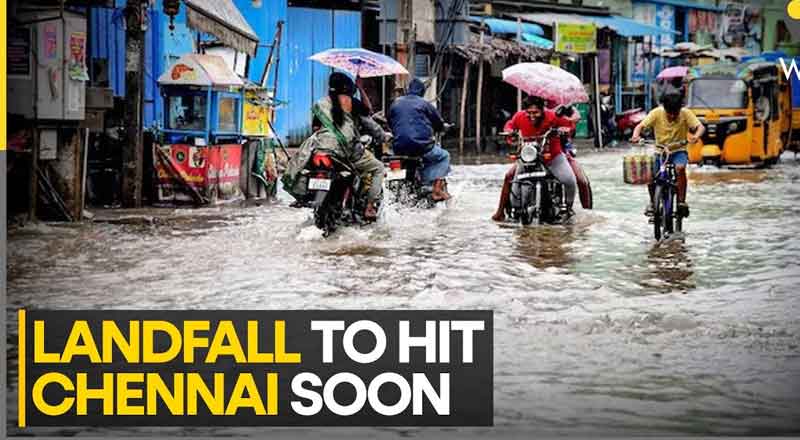Cyclone Fengal, a powerful tropical storm, is set to make landfall this afternoon between Karaikal and Mahabalipuram, bringing with it heavy rain, strong winds, and significant disruption across Tamil Nadu and Puducherry. The India Meteorological Department (IMD) has issued red and orange alerts for multiple districts, warning of potential damage and urging preparedness. As coastal states mobilize resources to mitigate the impact, the effects of the cyclone on daily life, infrastructure, and the environment are already apparent.
Cyclone Impact on Coastal States
Weather and Flooding Risks
Cyclone Fengal, with wind speeds of 70-80 kmph and gusts up to 90 kmph, has triggered heavy rainfall in northern and delta regions of Tamil Nadu, including Chennai, Tiruvallur, Kancheepuram, and Puducherry. The IMD has predicted isolated extremely heavy rainfall in districts like Thanjavur, Nagapattinam, and Mayiladuthurai, with low-lying areas at risk of flooding. Coastal communities are witnessing high tides, and rough seas have prompted authorities to advise fishermen to avoid venturing into the waters.
Disruption in Daily Life
The cyclone has brought life to a halt in several districts. Schools and colleges in areas under red and orange alerts have been closed as a precaution. Flight operations at Chennai Airport have been severely impacted, with IndiGo suspending services and Air India flights disrupted. In addition, strong winds are expected to damage telecommunications infrastructure, potentially affecting connectivity in the region.
Preparedness and Emergency Measures
Authorities have mobilized resources, deploying National Disaster Response Force (NDRF) teams and equipping districts with boats, generators, motor pumps, and tree-cutting equipment. Coastal residents have been urged to secure belongings and evacuate to higher grounds if necessary. These measures aim to minimize casualties and ensure swift recovery in the aftermath of the storm.
The Broader Implications of Cyclones
Cyclones are recurrent challenges for India’s coastal states, often leading to extensive damage to infrastructure, agriculture, and ecosystems. The heavy rainfall accompanying these storms can inundate roads, disrupt transportation, and cause long-lasting disruptions to livelihoods, particularly for farmers and fishermen. Furthermore, strong winds damage power lines, communication systems, and buildings, amplifying the economic cost.
Environmental degradation also compounds the challenges. Loss of vegetation, soil erosion, and saltwater intrusion into farmlands have long-term consequences on the ecology and local economy. Communities in these regions face recurring struggles with rebuilding homes and restoring livelihoods, emphasizing the need for resilient infrastructure and sustainable disaster management strategies.
As Cyclone Fengal approaches landfall, the immediate focus remains on mitigating the storm’s impact and ensuring the safety of affected communities. Tamil Nadu and Puducherry, supported by weather forecasts and disaster response mechanisms, are implementing pre-emptive measures to minimize damage. However, this event also highlights the recurring vulnerabilities of India’s coastal states to cyclonic storms. Addressing these challenges requires a dual approach: robust preparedness for immediate disaster response and long-term strategies to enhance coastal resilience in the face of climate change.
Cyclone Fengal serves as a sobering reminder of nature’s power and the imperative for human adaptability. For the people of Tamil Nadu and Puducherry, the hours ahead will test their preparedness and resilience, with recovery efforts poised to follow in its wake.
(With inputs from agencies)





